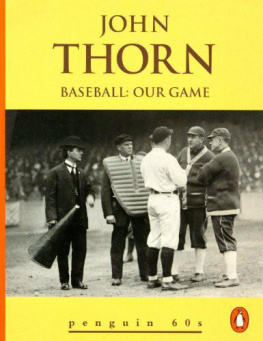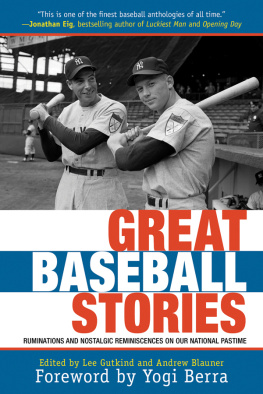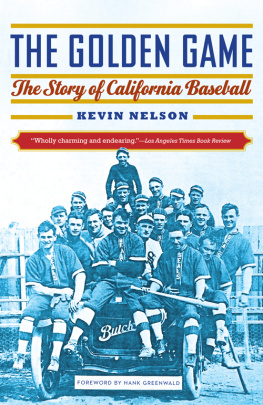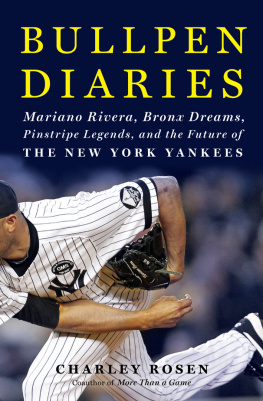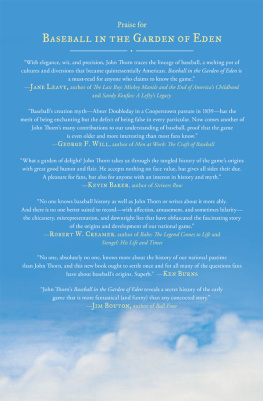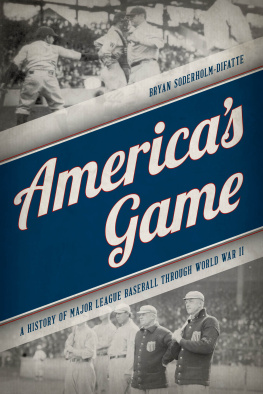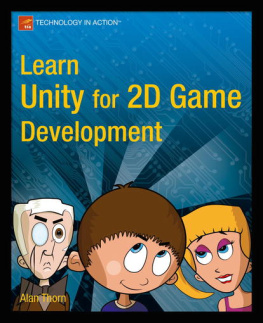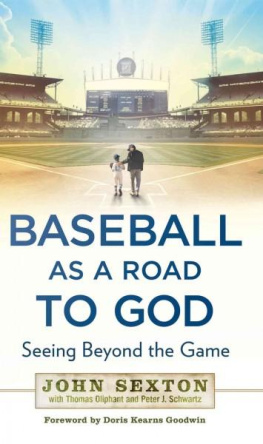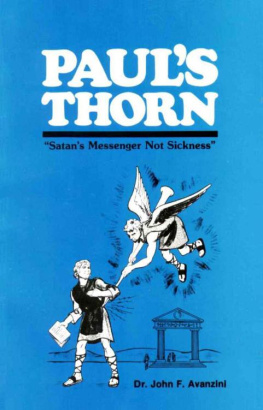John Thorn - Baseball: Our Game
Here you can read online John Thorn - Baseball: Our Game full text of the book (entire story) in english for free. Download pdf and epub, get meaning, cover and reviews about this ebook. year: 1995, publisher: Penguin Books, genre: Politics. Description of the work, (preface) as well as reviews are available. Best literature library LitArk.com created for fans of good reading and offers a wide selection of genres:
Romance novel
Science fiction
Adventure
Detective
Science
History
Home and family
Prose
Art
Politics
Computer
Non-fiction
Religion
Business
Children
Humor
Choose a favorite category and find really read worthwhile books. Enjoy immersion in the world of imagination, feel the emotions of the characters or learn something new for yourself, make an fascinating discovery.
- Book:Baseball: Our Game
- Author:
- Publisher:Penguin Books
- Genre:
- Year:1995
- Rating:5 / 5
- Favourites:Add to favourites
- Your mark:
- 100
- 1
- 2
- 3
- 4
- 5
Baseball: Our Game: summary, description and annotation
We offer to read an annotation, description, summary or preface (depends on what the author of the book "Baseball: Our Game" wrote himself). If you haven't found the necessary information about the book — write in the comments, we will try to find it.
Baseball: Our Game — read online for free the complete book (whole text) full work
Below is the text of the book, divided by pages. System saving the place of the last page read, allows you to conveniently read the book "Baseball: Our Game" online for free, without having to search again every time where you left off. Put a bookmark, and you can go to the page where you finished reading at any time.
Font size:
Interval:
Bookmark:
Baseball has been, most often for better but occasionally for worse, the American game. It has given our people rest and recreation, myths and memories, heroes and history and hope. It has mirrored our society, sometimes propelling it with models for democracy, community, commerce, and common humanity, sometimes lagging behind with equally instructive models of futility and resistance to change. And as our national game, baseball in no small measure defines us as Americans, connecting us with our countrymen across all barriers of generation, class, race, and creed.
Baseball in the Americas is more than a game. It is first and foremost about play, a fact obscured amid today's ferment of free agency, salary caps, and threatened cataclysm. Some 150 years ago, an overly solemn America was first indebted to baseball for the freedom it gave to play. Let's look at how child's play came to be our national pastime.
Even when baseball was in its infancy in the 1850s having just evolved from the boyhood game of rounders and its more formalized derivative, town ball the sport was already shaping the life of the country. Americans of the previous generation had been blind to the virtue of play, much perplexing our European cousins. We permitted ourselves few amusements that could not be justified in terms of social or business utility, or "seriousness." Nonconformists like the Olympic Town Ball Club of Philadelphia in the 1830s had to put up with a lot of guff, as this contemporary account details:
The first day that the Philadelphia men took the field ... only four men were found to play, so they started in by playing a game called cat ball. All the players were over twenty-five years of age, and to see them playing a game like this caused much merriment among the friends of the players. It required "sand" in those days to go out on the field and play, as the prejudice against the game was very great. It took nearly a whole season to get men enough together to make a team, owing to the ridicule heaped upon the players for taking part in such childish sports.
What brought scorn upon the heads of these staunch devotees of town ball (also known as "Boston Ball" or the "Massachusetts Game") was that although the game had regularly positioned fielders and demanded a modicum of strategic play, it still bore the childish essence of rounders: the retirement of a baserunner by throwing the ball at him, which necessitated a softer, less resilient ball than that used in the manly sport of cricket. Who was the genius who came up with the idea of retiring a runner by touching him with the ball or securing it "in the hands of an adversary on the base"? Perhaps it was Alexander Cartwright, who is known to many as "the man who invented baseball," though baseball was not invented; it evolved. But it may have been Daniel Lucius Adams or William Wheaton or Lewis F. Wadsworth.
No matter--this was the first step toward making an American game that could challenge boys and men alike, and that could take its place in the life of our nation as cricket had done in England. Henry Chadwick, the English-born cricket reporter who coined the term "national pastime" and became known as the "Father of Baseball," wrote that early on he
... was struck with the idea that base ball was just the game for a national sport for Americans and ... that from this game of ball a powerful lever might be made by which our people could be lifted into a position of more devotion to physical exercise and healthful outdoor recreation than they had, hitherto, been noted for .... In fact, as is well-known, we were the regular target for the shafts of raillery and even abuse from our outdoor-sport-loving cousins of England, in consequence of our national neglect of sports and pastimes, and our too great devotion to business and the "Almighty Dollar." But thanks to Base Ball... we have been transformed into quite another people ....
The transformation was from a hard-working but grim citizenry to a nation devoted to fresh air and exercise, not unlike the current rage for jogging, aerobics, and body building. Amateur baseball clubs sprang up like dandelions in the years immediately before the Civil War, but these were formed more for camaraderie and calisthenics than the pursuit of victory or the honing of skills. The demands of the new game on athleticism were few, as the one-bound rule remained in effect (an out was recorded if a ball was caught on a bounce), and a couple of weeks' practice were enough to make a novice of forty a creditable player. Men viewed baseball as a mild pastime, or relief from the mental strains of work; as a tonic, restorative of the physical energies needed for work; or as a release of the surplus nervous energy that impedes young men in their pursuit of purposeful work. America in the mid-1850s was learning how to play, but still viewed sport in terms of its salutary effects on commerce; not until the close of the War Between the States would the focus shift to learning how to play well--for its own sake.
Today we think of baseball as an anachronism, a last vestige of America's agrarian paradise--an idyllic game that takes us back to a more innocent time. But baseball originated in New York City, not rural Cooperstown, and in truth it was an exercise in nostalgia from the beginning. Alexander Cartwright and his Knickerbockers began play in Madison Square in 1842, and the city's northward progress soon compelled them to move uptown to Murray Hill. When the grounds there were also threatened by the march of industry, the Knicks ferried across the Hudson River to the Elysian Fields of Hoboken, a landscaped retreat of picnic ground and scenic vistas that was designed by its proprietors to relieve New Yorkers of city air and city care. In other words, the purpose of baseball's primal park was the same as that of New York's Central Park or, much later, Boston's Fenway Park--to give an increasingly urban populace a park within the city, a place reminiscent of the idealized farms that had sent all these lads to the metropolis.
Thus the attraction of the game in its earliest days was first the novelty and exhilaration of play; second the opportunity for deskbound city clerks to expend surplus energy in a sylvan setting, freed from the tyranny of the clock; and third, to harmonize with an American golden age that was almost entirely legendary.
Simple charms, simple pleasures. In the late 1860s, advancing skills led to heightened appetites for victory, which led to hot pursuit of the game's gifted players, which inevitably led to sub rosa payments and, by 1870, rampant professionalism. (Doesn't that chain reaction put one in mind of college football or basketball?) The gentlemanly players of baseball's first generation retreated from the field, shaking their heads in dismay at how greed had perverted the "grand old game"--now barely twenty years old--and probably ruined it forever.
Sound familiar? It should--the same dire and premature announcements of the demise of the game have been issued ever since, spurred by free-agent signings, long-term contracts, no-trade provisions, strikes and lockouts, integration, night ball, rival leagues, ad infinitum. The only conclusions a calm head might draw from this recurring cycle of disdain for the present and glorification of the past are that (a) things aren't what they used to be and never were; (b) accurate assessment of a present predicament is impossible, for it requires perspective; and (c) no matter what the owners or players or rulesmakers or fans do, they can't kill baseball. All three conclusions are correct. In baseball, the distinction between amateur and professional is not clear-cut: an amateur may play for devotion to the game ( amat being the Latin for love), but a professional does not play for pursuit of gain alone; he plays for love, too.
Font size:
Interval:
Bookmark:
Similar books «Baseball: Our Game»
Look at similar books to Baseball: Our Game. We have selected literature similar in name and meaning in the hope of providing readers with more options to find new, interesting, not yet read works.
Discussion, reviews of the book Baseball: Our Game and just readers' own opinions. Leave your comments, write what you think about the work, its meaning or the main characters. Specify what exactly you liked and what you didn't like, and why you think so.

